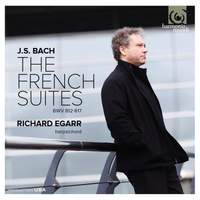Recording of the Week,
Richard Egarr performs Bach's French Suites
English harpsichordist Richard Egarr has been working his way through the major repertoire for the harpsichord for some time, scooping awards and critical plaudits along the route – Handel’s Eight Great Suites, Bach’s Well-Tempered Clavier, Goldberg Variations and English Suites, and now the French Suites.

It’s fair to say the latter set (incidentally, no more connected with Paris’ side of the Channel than the English Suites are with London’s – both names are the whimsical additions of subsequent editors) are much less exuberant and virtuosic; Egarr speculates (not without justification) in his notes that they may have been intended primarily for private performance by members of the Bach household, which would account for their often relatively introverted feel. As a result of this they have tended to be somewhat neglected relative to Bach’s other large keyboard works and collections – and when they have been recorded at all they have often been cut down by the omission of repeats.
Richard Egarr, though, is not having any such nonsense; his complete, fully-repeated French Suites extend over almost two hours. At no point does he feel rushed, and indeed quite often he allows himself what might seem luxurious levels of rubato. Insofar as these Suites can be said to have “slow movements” they’re invariably Sarabandes, and it’s in these that Egarr is at his most flexible – though even the faster movements benefit from a little elasticity around cadences and other key points. The beautifully rich unfolding of the Allemande that opens Suite No. 4 in E flat is a particularly good example of how expressive and even slightly indulgent rubato can create a really moving experience whilst still sounding entirely stylistically appropriate.
At this point I should sound a note of warning – if you don’t like ornamentation on your Baroque keyboard music, then this recording (and indeed Egarr’s style in general) is definitely not for you. The ornamentation is generous and virtually omnipresent, and Egarr makes no apology whatsoever in his accompanying notes for the artistic decision to adorn Bach’s music in this way. In some movements he even seems to have sacrificed some speed in favour of ornateness – the Gigue from Suite No. 6 in E major is decidedly leisurely in tempo, for instance, very far from the frenetic vivace that the dance’s title might suggest.
Where some players might indeed have used tempo as one method of differentiating the movements – taking the fast ones extra-fast and slowing the slow ones right down – Egarr relies on subtle changes of registration for his variety. Several section-repeats are marked out by a shift to a quieter, more muted sound – probably a lute stop, though the specifics of Egarr’s instrument aren’t given in much detail – while others gain a certain extra weight from the addition of an octave-doubling stop.
Without the touch-sensitivity of a piano, or the sheer number of stops of an organ, the harpsichord has fewer tools at its disposal to vary its sound than its keyboard cousins. It’s therefore testament to Egarr’s artistry that he renders nearly two solid hours of solo harpsichord varied and enjoyable – I think this owes much to his generous rubato (which smoothes the corners off what could otherwise be an almost mechanical sound-world) and the subtle but noticeable use of registration changes giving just a touch of spice here and there.
Every interpreter of Bach on the keyboard seems to put their own stamp on the music and find their own unique approach – from Landowska to Gould to Hewitt and more, it’s often easy to identify the performer from the style. This is certainly just as true of Egarr, and if at times I don’t entirely understand why he’s chosen to perform a certain phrase in a certain way, I’m mindful of Bernstein’s (in)famous caveat about Glenn Gould’s interpretation of Brahms. Egarr, too, is “so valid and serious an artist that I must take seriously anything he conceives in good faith, and his conception is interesting enough so that I feel you should hear it, too.”
...And don't forget - our special offer is still running, with up to 40% off a wide range of his recordings, both as a soloist and in chamber music. So if you like what you hear, it's the perfect time to explore more of his artistry.
Richard Egarr (harpsichord)
Available Formats: MP3, FLAC, Hi-Res FLAC



